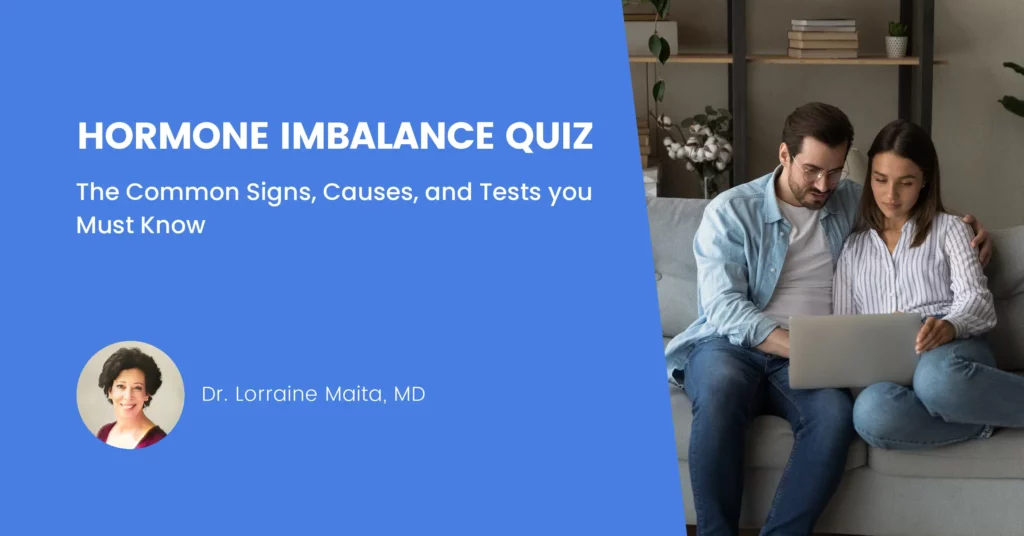- How to Balance Hormones with Supplements, Foods, and Lifestyle - October 26, 2022
- Hormone Imbalance Quiz: Signs, Causes, and Tests you Must Know - September 18, 2022
- The Longevity Lifestyle: Top Anti-aging Strategies to Turn Back the Clock - May 17, 2022
In this quiz: what to expect
In this hormone imbalance quiz, you will learn about:
- Common signs and symptoms of hormone imbalance in men and women
- Top lifestyle factors that may cause or contribute to hormone imbalances
- Key tests and important considerations
The purpose of this quiz is to increase awareness and help you recognize potential symptoms of hormone imbalance, which you can then share with a qualified health practitioner. To make it easier, you can enter your email at the end of the quiz and get the entire list of symptoms you checked emailed back to you.
An important note to couples
- Hormone imbalance may affect men and women differently.
- You may notice changes in your partner’s behavior if there are struggling with hormone imbalances, including their emotional well-being. Since people don’t always realize that these changes can be connected to hormones, their relationships may be affected. Increasing awareness of these signs can help you better understand and relate to your partner.
- Sharing your insights with your partner and doctor can help identify the best approach and treatment you may need.
Medical disclaimer
- This quiz is for informational purposes only. It is not intended to diagnose, treat, cure, or prevent any disease or to provide or replace medical advice. Please use this information to educate yourself as much as possible and share the information with a qualified health practitioner that you trust.
Understanding hormone changes with aging
As we age, it is normal to experience hormone changes. In general, we can say that the hormones that build us up go down. These primarily include our sex hormones – DHEA, estrogen, progesterone, and testosterone. At the same time, the hormones that break us down, such as the stress hormone cortisol, tend to go up.
So, you may expect some decline and changes in your hormone levels. This, however, doesn’t mean you have to suffer. Making sure your hormones are balanced and at optimal levels can help you age more gracefully, feel your best, and continue to enjoy a longer healthy, vibrant life, with a sound mind. Even more, certain hormone imbalances have been shown to increase the risk of age-related diseases. This means that addressing these imbalances can help protect your health. On the flip side, by doing nothing, you may be increasing your risk of chronic illness.
Also, many hormones that play a key role in aging are interchangeable. This means they often influence and convert into each other. Hormones can also be affected by other non-hormonal factors. For this reason, testing hormone imbalances always needs to consider their complex relationship rather than focusing on one or two hormones. Working with a functional anti-aging medicine doctor who specializes in hormone therapy can help you properly identify the type of hormone imbalance you may have, what’s causing it, and tailor the approach to your body’s needs.
Hormone imbalance quiz
In the short hormone imbalance quiz below, we’ll review some common signs that may indicate your hormones are not balanced. Keep in mind, hormone imbalances can affect your entire body, including the way you think and how you feel. Additionally, you may recognize these signs in your partner, which can help you better understand what they go through rather than feeling confused because of how they behave.
Hormone imbalance tests – Important considerations
As we mentioned earlier, sex hormones often influence and convert into each other. They can also be affected by the stress hormone cortisol and even other non-hormonal factors. To fully understand what’s going on in your body, it is essential to consider this complex relationship between the hormones and properly identify the potential root causes of the imbalances you may have. This goes above and beyond just “fixing” the levels of your hormones by taking hormones. For instance, since various hormones regulate each other, making sure the ratio between them is optimal often plays a major role in hormonal health.
To give you an idea, here are a few common examples of how different hormones influence each other, causing imbalances:
Progesterone and DHT imbalances in women
One of progesterone’s functions is to regulate the conversion of testosterone to dihydrotestosterone (DHT). If your progesterone is low, you may end up with higher DHT levels. Some of the symptoms of high DHT in women include hair loss, acne, and increased body and facial hair growth.
Estrogen dominance in men
Men often experience an imbalance in their testosterone-to-estrogen ratio, where their testosterone is low, but their estrogen levels are high. Some of the symptoms of estrogen dominance in men include abdominal weight gain, “men boobs,” low libido, mood swings, and others. In these cases, it is crucial not to focus just on testosterone replacement therapy (TRT) to bring your levels up, as it can make the estrogen dominance imbalance worse. Reducing estrogen as a part of hormone replacement therapy needs to be carefully monitored, as low estrogen levels in men can cause other issues as well.
High cortisol levels in men and women
You may not think of your current deadline at work as related to your sex hormones, but high cortisol levels can significantly suppress the production of sex hormones in both men and women. Even more, some of the symptoms or cortisol imbalance may be similar to imbalances of other hormones. And, as if this is not complex enough, cortisol levels often fluctuate throughout the day and can change rapidly in response to your activities. Your work, relationships, events in your life you may perceive as stressful, and different types of exercises you do, among other day-to-day activities – all can influence your cortisol levels.
With cortisol playing such a key role in overall and hormonal health, properly testing your cortisol levels can reveal life-changing insights that can be addressed with treatment. A qualified health practitioner can help guide you with the right tests, including the best time to test. I often help my patients interpret the results of their saliva cortisol tests (along with other tests). Together, we map their levels to events and activities in their life. In many cases, we come up with some very insightful, surprising findings.
How to balance your hormones
Once you figure out the underlying causes, you can turn this around without having to manipulate hormones or give hormones. That’s the beauty of the body. You take away what’s impairing it, and you give it what it needs. It’s a beautiful instrument.
– Dr. Lorraine Maita, MD
As we have seen in this quiz, hormonal imbalances can severely impair a person’s quality of life. And as this is not enough, certain imbalances have been shown to increase the risk of age-related diseases. This means doing nothing may increase your risk.
So, where do we go from here? Hormone replacement therapy (HRT) is one option that can make a big difference to many men and women. It is, however, not the only one. And it does come with risks one must consider. Another option, which have helped many of my patients, is to naturally balance your hormones with diet, supplements, and healthy lifestyle changes. With this way, we also address potential issues in your body that may cause or contribute to hormone imbalances. Once you figure out the underlying causes, you can turn this around without having to manipulate hormones or give hormones. That’s the beauty of the body. You take away what’s impairing it, and you give it what it needs. It’s a beautiful instrument.
To learn more, see:


